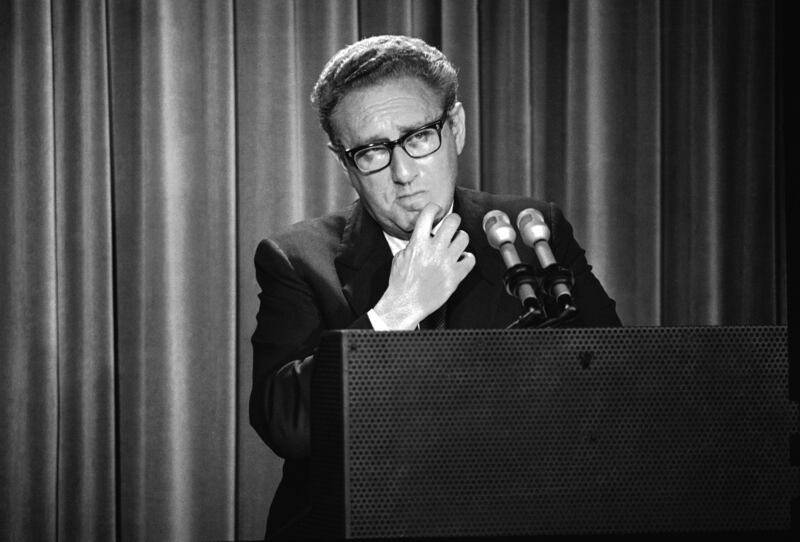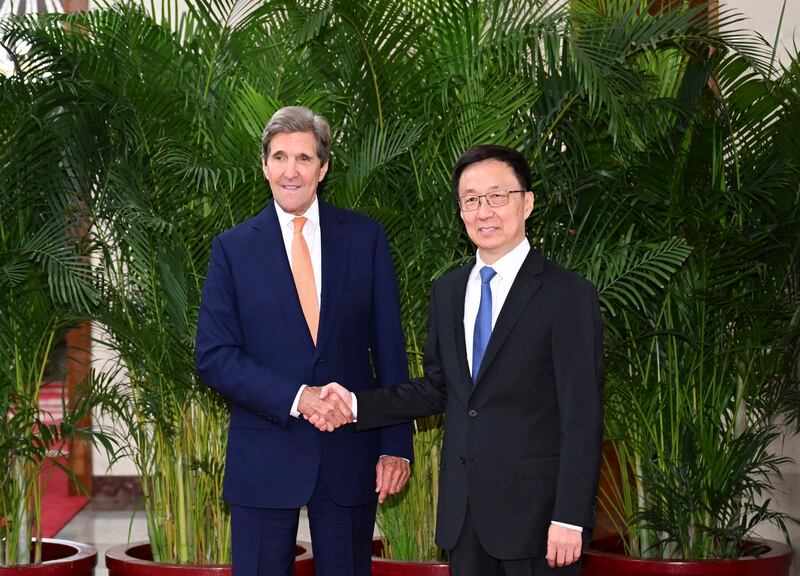Chinese President Xi Jinping on Thursday met with veteran diplomat Henry Kissinger in Beijing, in what some see as a snub to U.S. climate envoy John Kerry, who left the Chinese capital the previous day.
However, the South China Morning Post, quoting a "source," said the "private visit" had been planned months earlier and the fact that it coincided with Kerry's trip was coincidental.
The source said that the 100-year-old Kissinger would share his impressions of talks with China’s senior leadership with the U.S. government when he returns home.
Xi met Kissinger at the Diaoyutai state guest house in Beijing, where he told Kissinger Chinese people place a high value on friendship.
“[W]e will never forget our old friend and your historic contribution to promoting the development of US-China relations and enhancing the friendship between Chinese and American people,” Xi said.
Kissinger played a key role in normalizing U.S.-China relations when he was then-president Richard Nixon’s secretary of state in the 1970s. He continues to be held in high regard in China.

Kissinger met with sanctioned Chinese Defense Minister Li Shangfu on Tuesday, and on Wednesday he met with Wang Yi, China’s top foreign affairs official.
Wang reinforced China's position on Taiwan, telling Kissinger independence was "incompatible with peace across the Taiwan Strait," according to a statement by China's foreign ministry.
It is likely that China is nostalgic for a time when it could seemingly do no wrong, and Kissinger is seen as the right man to call on Washington to be more conciliatory.
“The current U.S. policy toward China is eager to transform China or contain China, which will not succeed and it is doomed to fail. Wang delivered this message to the Biden administration through the talks with Kissinger, urging the incumbent US officials to have the political courage to adjust their China policy,” Wu Xinbo, director of the Center for American Studies at Fudan University, told the Global Times on Wednesday.
The U.S. State Department indicated that Kissinger was not representing the U.S. in Beijing.
“I will say he was there under his own volition, not acting on behalf of the United States Government. And I don’t have any further updates on his trip,” said State Department spokesperson Matthew Miller.
Miller added that it was not his understanding that Kissinger’s meeting violated any sanctions.
“In fact, we have said that we believe … our own secretary of defense could meet with the sanctioned defense minister, and that would be appropriate to do so,” Miller added.
Political demands
During John Kerry’s climate talks in Beijing this week, Xi warned that China will not have its path to curb emissions dictated by others.
“The path, method, pace and intensity to achieve this goal should and must be determined by ourselves, and will never be influenced by others,” Xi said at a national conference on environmental protection, according to state broadcaster China Central Television.

But Vice President Han Zheng, who met with Kerry on Wednesday, said that Beijing would be willing to work with the U.S. to mitigate the climate crisis, as long as its political demands are met.
Han told Kerry that addressing climate change was “an important aspect of China-U.S. cooperation,” but was predicated on mutual respect, the official Xinhua News Agency reported. He said it must proceed “on the basis of U.S. attendance to core issues that concern both parties, fully engaging and exchanging ideas.”
It is not unusual for China to seek leverage even in areas of shared or global interest, as is the case in global warming.
The two countries are at odds on multiple fronts – China’s claims on Taiwan and the South China Sea, its human rights record and over technology transfers, which the U.S. wants to restrict in its national interests.
U.S.-China relations have frequently in recent months been described as being at a historically unprecedented ebb.
Edited by Mike Firn.
